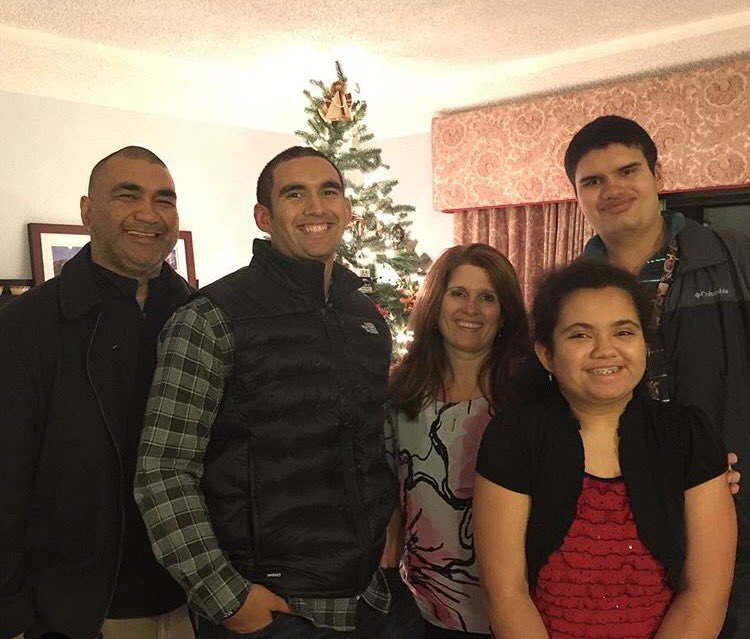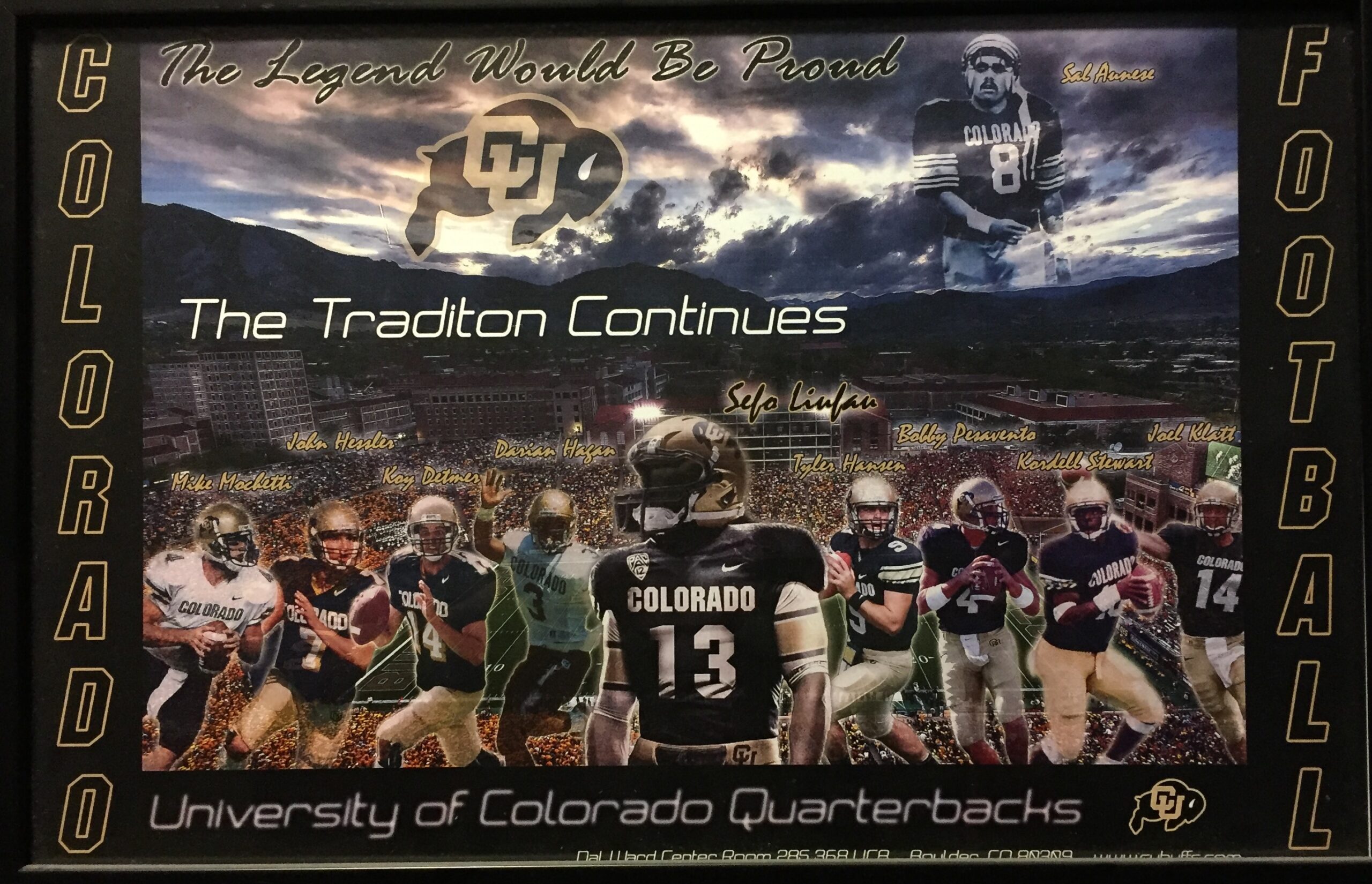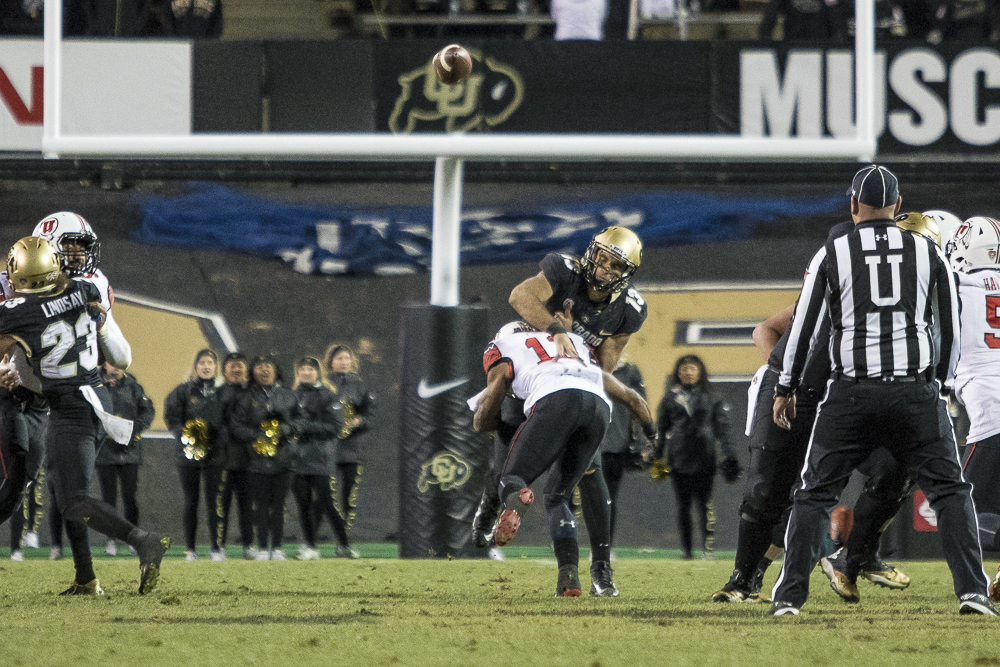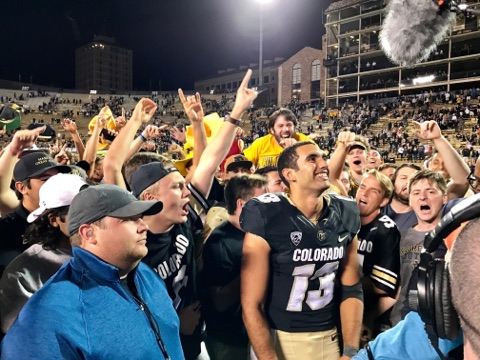© 2026 ALLCITY Network Inc.
All rights reserved.

BOULDER — A man’s character is not shaped on the gridiron, leaders are not born between the lines, toughness is not learned on the field. Football, you see, does not make the man; football reveals the man.
It takes but a moment of time spent with Colorado quarterback Sefo Liufau to feel his presence, you only need to see a few plays to become familiar with his toughness, but it took a lifetime to shape the Sefo Liufau Colorado fans have come to love in 2016. Understanding his story makes it easy to understand how he became the man he is.
Loyalty
The year is 2004 and, like every weekend, the Liufau household is full of Sefo’s friends. A fifth-grader at the time, Sefo goes with a few of his buddies to his room to play a game, leaving a few others and his younger brother Saia in the family room. When Sefo returns, he’s disturbed to find that his friends were no longer playing with his brother, who at the time dealt with a speech delay.
“I told Sefo when he was very young, ‘Your brother is the only brother you have, so you have to look out for him,'” Sefo’s father Joe Liufau remembers. “I think fifth grade is when it started clicking for him.”
The young Sefo kept it to himself, but the next weekend, the Liufau house was stunningly quiet.
“Hey, how come you don’t have your boys over?” Joe asked his eldest son.
“If they don’t want to play with my brother,” Sefo responded. “I don’t need them.”
It was an early sign for Joe Liufau regarding the man his first son would go on to become, and just one benchmark in a special relationship between Sefo and Saia.
“I couldn’t ask for a better older brother for a younger kid,” Joe remembers. “As he grew up, he always watched out for his brother.”
That loyalty, that love would build an unbreakable bond between the two of them, a bond that causes Saia, who can now talk for hours, to pause  before finding the words.
before finding the words.
“Well to put it simply, honestly, he’s the first step towards everything,” the younger brother explains. “Sometimes people take paths, and you follow them, and something good will come out of it. Wherever my brother goes, I just go with the flow. I just let him focus on himself, and he usually lets me focus on myself.”
“I know he loves me and I know I love him,” Saia says simply.
Sefo’s devotion to his family was curated at a very young age. In 2000, Joe was deployed with the Army for a year tour in Korea. A six-year-old was left to be the man of the house, a job he did not take lightly.
Any time he could, dad would call home. His young son would answer sternly and maturely, assuring his predecessor at the head of the table that his mother and two younger siblings were alright in his hands.
“Those are the times he had to step up another notch because I wasn’t around.”
16 years later, you can still hear in Joe Liufau’s voice how hard it was for him to leave his wife Heather with three young children.
Sefo did his best to make it feel like just two.
Understanding his loyalty to his family helps us to understand his loyalty to the Colorado Buffaloes.
“If we go back to his recruitment, I said, ‘Sefo, Colorado gave you your first offer, take a good look at it,’” Joe recalls. “’Remember, these are adults, if you don’t think you’re going to go to Colorado, then you let the coaches know that you’re moving on. But if you like the school, you don’t have to go out and get 20 offers to be a legitimate quarterback, even if you have 20, you’re only going to pick one, so if you like it, take it.'”
“We went to Colorado; we stayed for two days, and he was like, ‘Man, this is the place for me.’ And he decided to commit to Colorado.”
Drive
Call it destiny, call it fate, call it something else if you please, Sefo Liufau was meant to lead the Colorado Buffaloes for head coach Mike MacIntyre.
In a sense, it was the loyalty mentioned above that led the perfect pair together. As you may recall, Sefo Liufau did not commit to Mike MacIntyre’s Colorado Buffaloes; he committed to Jon Embree, Rip Scherer, and the former staff.
As the men he gave his word to were shown the door, it would have been easy for him to follow them out, but as others programs came knocking at the door of his high school, they were quickly turned around.

“Once Sefo commits to something, he’s gone,” his high school coaches warned staffers from schools such as Oregon State and yes, even San Jose State, as a couple of guys named MacIntyre and Lindgren inquired about the intriguing prospect to lead their blossoming WAC program.
“Sorry, I’m going to Colorado,” Sefo reinforced as schools called. “I made a commitment to Colorado.”
Without a staff in place yet at his future school, the high school senior kept in touch with the man he once thought would be his position coach.
“Coach Rip was still trying to keep him at Colorado,” Joe Liufau remembers with a loving laugh. “He was like, ‘Don’t worry Sefo, this is part of our job, this is how coaching is, sometimes you go through these times, but Colorado will be your place.’”
Scherer would prove to be prophetic.
Not long after those conversations, the university would hire that west-coast coach with the Southern drawl who had called from San Jose.
MacIntyre’s first order of business? Calling each and every player who had committed to the previous regime to reassure them, he would honor their scholarship offer. Such a move strikes a chord with a kid like Sefo Liufau.
The two were a match made in heaven.
You see, MacIntyre was hired by Colorado after displaying his ability to rebuild a program, turning a cellar-dweller in SJSU into a 10-win program but what many don’t know is that Liufau, too, was looking for a second renovation project. The kid has always welcomed a challenge.
About four years before Liufau was set to head to CU, his parents were faced with a similar decision.
Joe was going to send Sefo to the local powerhouse football program for high school, his wife Heather had other plans, reminding dad that he had preached to Sefo for years that education comes before football.
“I’m sorry man, but Mom is right,” he told his son.
Sefo would be heading to Bellarmine Prep, a school that was known for anything but football.
“No worries, I’ll change it,” the eighth-grader told his dad. “I’ll make it happen.”
“There was no star power,” Joe remembers of the squad Sefo set out to turn around.
A few years later—behind No. 13—Bellarmine was playing in their first state championship the history of the school.
“I think that’s why he decided to go to Colorado,” Heather Liufau says, grabbing the phone from her husband. “He wanted to go to Colorado to help the program.”
“He wanted to play at a place that he could change,” Joe adds in, the phone now on speaker. “He looked at it as a challenge to prove everybody wrong. That if they play together, fight together and believe in themselves, then it will change.”
The quarterback, like the man who would soon be his coach, had fallen in love with the idea of constructing something. Both men more a carpenter than an interior designer.
Together, they were about to build something special.
Toughness
At this juncture in the story, you might be able to gather who Sefo Liufau credits for the remarkable toughness that makes so unique; as a quarterback and as a leader.
From the early responsibility to the tough military love, Sefo had no choice but to be tough as the son of Joe. The basketball games on the army base didn’t hurt either.
“You had to learn really quick not to complain and to just battle the whole time,” the quarterback remembers.
 Foul calls were so few and far between that he remembers the only one he ever earned, his dad and multiple teammates had to get in somebody’s face after an opponent ripped the collar of his shirt trying to stop him from getting to the rim.
Foul calls were so few and far between that he remembers the only one he ever earned, his dad and multiple teammates had to get in somebody’s face after an opponent ripped the collar of his shirt trying to stop him from getting to the rim.
“It showed I had kind of earned a little bit of respect within the group,” he says with a reminiscent smile.
That memory lines up quite nicely with the moment it was clear Sefo had earned that same respect with his Buffaloes.
Nov. 2, 2013, the Buffs fight but fall to UCLA in Pasadena. The redeeming memory, though, happened when then freshman QB Liufau is hit late by UCLA star Anthony Barr, leading his offensive line to go to blows with the UCLA defense.
As he always does, Sefo popped right back up, but it was clear then that after only a few weeks at the helm, Sefo had earned the respect of his teammates, it was something he would never relinquish.
“I thought our quarterback, the way he competes, the way he fights, the way he keeps standing in there, I think that gives our whole team a lot of hope – I really do,” MacIntyre said after the game.
It was the world’s introduction to Sefo’s toughness, and it finally began to feel like Colorado had some “dog” in them.
“Sefo is a dog. He’s a dog, he’s a warrior,” running back Phil Lindsay says today of his quarterback. “I respect that man, I’ll go to war with him any day, and I’ll put my body on the line for him any day.”
“Dog” is Lindsay’s favorite compliment.
“A dog is somebody that you know you can know when you look to the left or right of you, he’s going to have your back,” the team’s emotional leader explains. “You know that he’s going to get up every play, you know that he’s not going to stop fighting. He’s gonna have that swag; he has to understand that we’re the stuff, you know, we’re the bad dudes around town. That’s what you have to have. Not everybody is a dog, but when you get a couple of them together, then you have something special.”
Dogs are strongest when they fight as a pack. On the field, it’s Liufau and Lindsay, off the field it’s Sefo and Saia.
“He has the physical toughness, and I have the mental toughness,” younger brother explains. “Together we are unstoppable. I guess that’s just how my dad raised us.”
It always comes back to the leader of the pack.
“My head cannot wrap around the importance of it, honestly,” Saia says of his father’s love “I kind of have no words for it.”
“In a way, I play for him,” Sefo adds. “He wasn’t able to play after high school because he joined the army when he was 18 on the island and was in the Army ever since… When you come from a very prideful nation, you really want to just play for those who really helped bring you up and cared for you all of these years.”
Joe had never heard his son say that before.
“That brings a tear to my eye,” he says. “It’s humbling to know that my son is pushing it to the next level just to show how thankful he is for the opportunity that was provided. That’s great to know… There are a lot of athletic kids back home, but the opportunity is not there. You have to get off of the island and find the opportunities. For him to get here and take advantage of the opportunities and going to the next level, knowing what he and I talk about. If that what Sefo said, then I’m humbled.”
Sefo took that opportunity and went about representing his father and his country by winning the 2016 Polynesian Player of the Year award.
Rise
It’s Nov. 29, 2014, and the Buffaloes are fighting for their first Pac-12 win in the last game of the season, one last chance to send a group of seniors—who won’t be going to a bowl game—out on a high note.
Leading Utah 34-31 in the fourth quarter, Sefo drops back to pass and lofts a screen towards the line of scrimmage. Out of nowhere Dom Hatfield of Utah swoops in, intercepts the ball and takes it to the house, giving the Utes at 38-34 lead. That would be the final score.
“I was heartbroken,” Liufau remembers exactly two years later. “To be ahead and to give it all away… It’ll stick with me, those kind of mistakes will always stick with me.”
Criticism hit the sophomore quarterback from every angle.
“I remember a girl once telling me it was all my fault… She just said it was completely my fault,” he recalls. “It was tough. I think whenever people you don’t know come up to you and share criticism to your face, it’s frustrating, you know? But I can see where they’re coming from.”
As always, Sefo shook it off. As always, Saia had his back.
“When he goes through those struggles, Saia always talks to him about the haters and all that stuff,” dad says with a laugh. “Saia will always give him encouragement—because Saia gets on and reads all that stuff—and then his brother calls and he says, ‘Sefo, don’t worry about all those people, don’t worry about anybody, just worry about Sefo, let me worry about those people.’”
As tough as the end of 2014 was, 2015 was tougher. Rather than fighting with his guys, Sefo was stuck on the sidelines, nursing a Lisfranc injury suffered in a Week 11 matchup with USC. The diagnosis wasn’t exactly promising.
All of the sudden, doubt crept in regarding whether the captain would be able to see it through in his senior season, whether Liufau would get a chance to finish what he started, to feel the payoff of all the work he had put in.
All of the sudden, the coaches were searching for reinforcements. All of the sudden, a man by the name of Davis Webb was the one being talked about as the quarterback who could finally turn Colorado around.
“It would never feel good to hear talk about somebody else coming in, and it sounds like they’re just going to give him the spot,” Lindsay says, explaining how most would feel. “You’ve given so much to this program, and you feel like they’re going to throw you to the side or something like that.”
Sefo didn’t necessarily see it that way, though.
“He didn’t really care about himself,” Joe explains. “He cared more about Colorado because if he weren’t ready, it would be selfish for him to think they couldn’t bring somebody else in to help the team.”
“I think the biggest thing for me was getting back to being healthy first,” Sefo adds in. “Because if I wasn’t healthy, then it wouldn’t matter and if I did get healthy and he was here, then may the best man win. That’s kind of how I saw it; I just wanted to do my best to be healthy again.”
As Lindsay will tell you, though, don’t believe for a second that the noise didn’t put a spur in the side of Liufau’s rehab.
“Fair to say,” Sefo admits with a laugh. “Any time people don’t include you in the talk of playing next year or anything like that really, you definitely get a sense of a little extra motivation. You want to get back a little bit faster; you want to be a little bit stronger and a little bit better. I think, for the most part, I did that.”
When noise got loudest, Lindsay felt the need to show his support for his captain.
“One time, I came out of a meeting and texted him,” he explained.
“It was a long text,” Sefo remembered with a smile.
The full contents of the message will remain between the two of them, but Lindsay shared its conclusion: “No matter what, you’re my quarterback and you’re going to be the reason why we win this year.”
The move—a text—was out of character for Lindsay.
“I was taken back,” Sefo explains.
It served as another dousing of gasoline on the fire that was Sefo’s rehab, which was now progressing rapidly.
“I don’t know if that was one of the reasons Davis Webb changed his mind,” Joe Liufau says.
Webb ended up going somewhere that didn’t have a locker room full of 100 plus dudes believing in the previous starter. Sefo, of course, got healthy. That fire, though, kept burning, it was time for he and his fellow seniors to finish what they started, to finish the games they kept coming oh-so-close in.
Blowout wins against Colorado State and Idaho State showed the world that Liufau’s scorched-earth attitude had matriculated into the blood of his teammates. An injury suffered while leading in Michigan, and subsequent strong performances by young backup Steven Montez served as one last ax swing at Sefo’s trunk, but in the end, the fact that every man in that locker room knew to be true was proven.
There was no cutting down Sefo Liufau, not this year.
On Oct. 15, 2016, the Buffaloes were set to take on the Arizona State Sun Devils at Folsom Field, the quarterback still a game-time decision. As the offense took the field, there was a moment that anybody who knows Sefo Liufau’s story won’t soon forget.
“At quarterback for the Buffaloes,” the P.A. announced. “No. 13, Sefo Liufau.”
The crowd went nuts. A standing ovation.
It was their acknowledgment for all he had put in, their apology for ever doubting him, their plea for No. 13 to take his team where they now believed they could go.
 “I teared up a little bit,” Heather Liufau admits. “They were embracing him.”
“I teared up a little bit,” Heather Liufau admits. “They were embracing him.”
It was the first time they had embraced him in that way. The same folks calling for his head after the mistakes he made in the past were now chanting his name.
Sefo—with the help of those teammates who had believed in him all along—rewarded his new believers with a win, followed by another, and another, and another, and another, and another, and another.
Their first bowl game in over a decade, their first ranking in over a decade, their first division title in over a decade, all behind the leadership on No. 13.
Now, when he goes out in public, instead of, “it’s all your fault,” he hears, “Can I get a picture?”
“It’s all… interesting,” he says in a humble tone, unable to find a better word to describe the layers of it all. “It’s just, the whole switching of failure, failure, failure to being successful.”
He pauses for a second.
“It’s amazing to me… I just get taken back.”
The rise of Sefo Liufau is aptly summed up by an excerpt his brother Saia shared from one of his famous pep talks for his big bro. This time, though, he was referring his own challenges.
“If I’m in a failing moment, if I know I’m failing, I should not be in this position. All I should be thinking about right now is just to keep on going higher and higher and higher until you reach that one goal. If you’re like me and you keep fighting, you fight for things you never imagined you were fighting for in the first place.”
It takes but a moment of time spent with Colorado quarterback Sefo Liufau to feel his presence, you only need to see a few plays to become familiar with his toughness, but it took a lifetime to shape the Sefo Liufau Colorado fans have come to love in 2016. Understanding his story makes it easy to understand why Sefo Liufau is the man who was meant to revive Colorado Football.
Comments
Share your thoughts
Join the conversation




